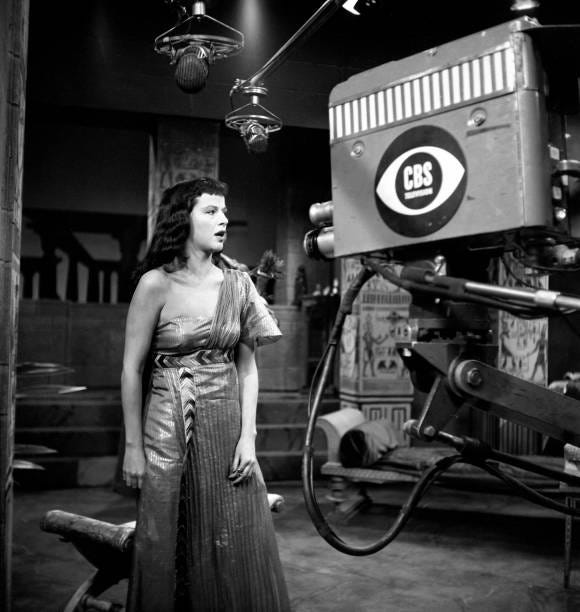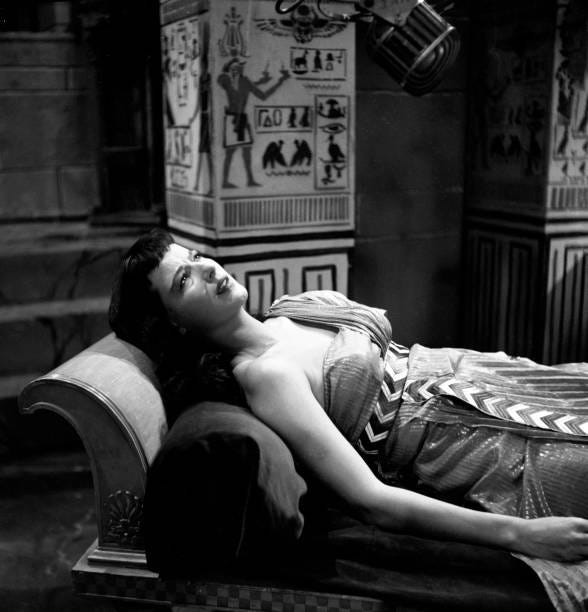Kim Stanley: I Want The Work, Not The Process
"I came to give you a performance, not an autobiography or an autopsy."

In 1953, Marian Seldes appeared with Kim Stanley on an episode of the CBS program You Are There with Kim Stanley. Entitled “The Death of Cleopatra,” the episode was part of a popular program hosted by Walter Cronkite, who would take us back in time to be a part of a historical life or moment. Cronkite would tell the audience something along the lines of “It is the death of Cleopatra, and you are there.
In The Bright Lights, Marian’s 1978 memoir, she wrote of working with Stanley, and how the actress, always committed and excellent, suddenly arose from the bed upon which Cleopatra was set to die, ran from the studio and savagely cut her eyebrows, and returned to greater power.
Stanley would tell me that there was more than just cutting at her eyebrows, but, as you’ll see, she wasn’t going to tell me what else was going on, even if she could remember it.
In 1992 I visited Kim Stanley in Los Angeles. We had spoken by phone for about two years, and this was our only in-person visit. One of the things we discussed was that You Are There episode, but it grew from there.
»»»»»»»»»»»»»»»»»»»»
James Grissom: Marian [Seldes] told me she wrote to you recently.
Kim Stanley: She did. It was a sweet letter. I haven’t responded yet. I’m bad about that. But I will. She reminded me—again—of the time we worked together.
JG: On You Are There?
KS: Yeah. She reached out to me when her book [The Bright Lights] was being written. She wanted to be sure that she got the story right, and she did, but I had no memory of it. I mean, when she sent me the pages, I remembered it, but I didn’t carry it with me. It wasn’t significant beyond that day in that part in that program.
JG: You had a revelation, and you left your position on the stage…
KS: …Really pissing off the crew, I’ll tell you!
JG: Because something occurred to you?
KS: Yeah, and don’t ask me what it was. I don’t remember. But if I did remember, I wouldn’t tell you. No actor ever should. I never will. I suddenly thought, in that part, that day, that I didn’t have the right mental placement, so I didn’t look right, and I couldn’t play it right. I was Cleopatra. What do I know about Cleopatra? I mean, they gave us information, pages of biography, but who was Cleopatra, really? She was a woman. She was mighty, clearly intelligent. Those are just words. Adjectives. I am always trying to find the real person in the part, and something just came over me, and I felt I knew something, and I had to apply it to my performance.
JG: Is it true that Marian invited you to speak to students at Juilliard?
KS: Yes. Several times. I didn’t go. Did I? I don’t think I ever did. [Marian says Stanley visited the school, but never spoke to a class or conducted a class.] I wasn’t in good shape when Marian first asked me, and later, I just thought I couldn’t be of any help to those students. I like to think I can be of help to students in an ongoing course of study. You develop a relationship. You see an actor’s work as it progresses, or doesn’t. Either way, it’s a relationship. I don’t like what I call ‘spot’ training. It’s like ‘spot’ reducing. It’s a good idea, but it doesn’t work. I’m not saying I haven’t called on people I admire to talk about a problem I’m having with a part, with my life, whatever. I’m not saying that. But the solution always came from within me, out of those conversations. People can be very helpful. They can ask you questions and tell you how they dealt with something similar, but you have to take it and apply it to your problem, and—maybe—you get an answer, a solution.
Another thing I don’t want to do—and I feel this is what I would have been expected to do for Marian—is to talk about specific parts and specific people. Anecdotes. Memories. As I told you on the Cleopatra thing, I didn’t remember. I was able to be reminded, but I’m not holding on to those thoughts. An actor can’t index or archive the memories or the exercises that worked in the past, once, in a given moment.
JG: Never?
KS: Well, no. That’s just my experience and my opinion. If someone asked me how I came to understand and to convey Millie [in William Inge’s Picnic], I might be able to pull it up and share it with you, but why? That was then, first of all. Also, I know that I drew on experiences in my own life, at particular times, with particular relatives and friends. None of that would mean anything to you or to any student I might speak to. It’s my experience. Who knows my family? Or me? It meant something to me. It worked for me. So when I teach or speak to actors, I might say what I just said to you, but I would also ask them to remember specific incidents in their lives. And then I would beg that they not tell me or other students what any of it was. Keep it. It’s yours. Harold Clurman once said that an actor’s body was like a cabinet with various drawers and shelves—nooks and crannies—and whatever you’ve pulled from your life and your imagination goes into that cabinet, and that cabinet is what you haul to the theatre every night. You put makeup on that cabinet—you—and then you pull out all the items in that cabinet in service to the character and to the playwright who created it and the audience that is watching you. All that stuff in that cabinet—in me—is only valuable to me, at that time, in that part. It’s not for anybody else. What other great actors and actresses have done—pulled from their cabinet—is theirs, it’s personal, and it’s valuable to them.
I want the memory of a performance. If I had met or known Laurette Taylor, I wouldn’t have wanted her to tell me what she pulled out of herself to play Amanda. [In Tennessee Williams’ The Glass Menagerie.] I would probably hate it—what she told me. Because it might have been significant and beautiful to her, but it would not have explained her performance to me. When you told me what Gerry [Geraldine Page] had done in a particular scene [in Williams’ Sweet Bird of Youth], I smiled and thought it was so like Gerry. So intelligent and apt and ideal for that moment, but another part of me was angry with you for telling me that. Because now my memory of what she did—how she transfixed and terrified me—now has that story attached to it. Now when I look back on that performance, I’m going to be thinking, Oh, and here’s what Gerry told Tennessee and [Elia] Kazan what she was doing. I don’t like that. I want the work, not the process.
If someone is a good actor, there is a very detailed and personal series of things that go on to be good, and it’s just too much the property of the actor to be shared. I came to give you a performance, not an autobiography or an autopsy.
© 2024 James Grissom





